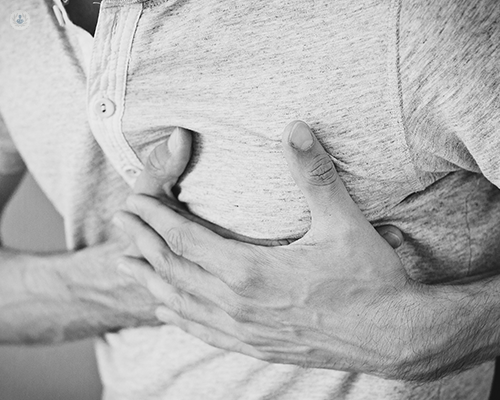How are chest pain and heart attacks related?
Escrito por:Pain or discomfort in the chest can be a worrying symptom and should never be ignored. There are many structures in the chest including the heart, lungs, oesophagus, major blood vessels and the sternum/ribs all of which can cause discomfort.
We speak to leading consultant cardiologist Dr Navin Chandra about the connection between chest pain and heart attacks in this informative article.

What causes chest pain in myocardial infarction?
Pain due to the heart is called angina and occurs due to narrowing of a blood vessel supplying the heart muscle.
A heart attack (myocardial infarction) is a more severe form of this pain that occurs when a blood vessel supplying the heart muscle is completely blocked by clot.
What are the characteristics of chest pain in myocardial infarction?
Typically, the chest pain during a heart attack is described as ‘heaviness’ or ‘tightness’ in the centre of the chest that is worse with exertion and relieved with rest.
The pain may radiate to other areas including the:
- Left arm;
- Neck, or;
- Jaw.
There can also be associated symptoms of shortness of breath, sweating or sickness.
How are heart attacks treated?
This is a medical emergency and requires urgent attention by a cardiologist to unblock the blood vessel using a combination of medications and placement of a ‘stent’ inside the blood vessel to restore blood flow to the heart muscle.
Once blood flow is restored the chest pain will begin to subside and the extent of damage to the heart can be assessed by ultrasound scans (echocardiogram) prior to further optimisation of medical therapy and assessment of risk factors for heart disease.
If you’d like to discuss concerns you may have regarding chest pain or any other cardiology issues, arrange an appointment with Dr Chandra today.


